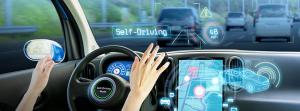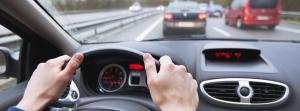Higher immigration drives lower crime
October 2017
The common narrative is that immigration and crime go hand-in-hand.
But that's not the case, says Charis Kubrin, professor of criminology, law and society. Kubrin published a meta-analysis earlier this year of more than 50 studies examining the relationship between immigration and crime. She found that higher immigration results in less crime.
The moral thicket slowing adoption of driverless cars
Associate Professor Azim Shariff examines what is needed to spur greater acceptance of driverless cars.
The technical hurdles to driverless cars are nearly flattened, and the vehicles are just around the corner, but passengers have trust issues.
When riding in an autonomous vehicle, passengers give life-and-death decisions over to algorithms. And when it comes to moral choices – should a car sacrifice its passenger to, for example, avoid killing a couple pedestrians? – passengers in driverless cars are forfeiting their agency.
Hence the trust issues, writes Azim Shariff, associate professor of psychology and social behavior.
Repressed memory: Did it happen or not?
September 2017
For decades, Elizabeth Loftus, distinguished professor of social ecology, has been at the center of the national debate about false memories. In 1995, she published a landmark study in which participants were told they had an experience of being lost in a mall as a child. Many people subsequently "remembered" the experience.
Defense lawyers increasingly use genetic argument
September 2017
Pinning a crime on particular gene is a tricky and fraught business. Although certain genes have been linked to more antisocial or criminal behavior, many factors, such as their social environment, play a role in whether a person commits a crime.
But lawyers may still be inclined to claim their defendants had a genetic predisposition toward crime -- and should be held less responsible because of that.
"My sense is that geneticists are doing basic science to advance our understanding of human nature, and that attorneys who are aware of this stuff and who are very clever will come up with ways and try and morph that into a legal argument," Nicholas Scurich, associate professor of psychology and social behavior, told Popular Science.
The hurdles to adopting driverless cars
September 2017
Driverless cars pose an ethical and psychological challenge. Overall, they are undoubtedly safer than cars driven by humans, because people are bad drivers.
But public acceptance and adoption of driverless cars will face hurdles, especially since they essentially allow algorithms to make complicated moral choices. When faced with difficult moral dilemmas -- should a car sacrifice a passenger to save three pedestrians? -- humans are no longer in control.
And who decides what choices the algorithms should be programmed to make?
Azim Shariff, assistant professor of psychology and social behavior, examines such moral dilemmas, and how people respond to them, in a new commentary featured in Quartz.
What do you see: the officer or their attire?
Ph.D. student teams up with Irvine PD chief -- a Social Ecology alum -- to study public perceptions of police.
Rylan Simpson wanted to know: when people spot a police officer, what do they judge: the officer, their attire, their mode of transportation, or their expression?









